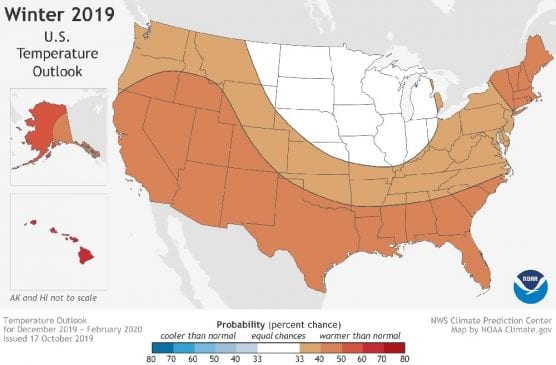California is expected to experience a drier than average winter in 2019-2020, according to an outlook published by federal climate experts Thursday.
The Climate Prediction Center released its winter outlook for the season that begins in December and runs through February, predicting warmer than average temperatures for much of the contiguous United States.
Along with California, eastern Texas and much of Louisiana will experience drier than average winters, which could exacerbate drought in portions of the Lone Star State.
Drought already exists through much of the southern tier of the United States and is especially severe in the Four Corners region of the Southwest.
If the predicted precipitation patterns hold, drought is likely to develop in Northern California as the winter progresses – setting up a summer of dryness for the Golden State in 2020.
A large swath of the northern Plains is on tap to get more precipitation than average according to the models run by the prediction center.

This 2019-20 Winter Outlook map for precipitation shows wetter-than-average weather is most likely across the Northern Tier of the U.S. this coming winter. (NOAA)
Much of the outlook is based on the current activities in the Pacific Ocean, where the El Nino Southern Oscillation Pattern often influences winter weather patterns for the continental United States.
This year, oceanic conditions are neutral as opposed to the last couple of winters where El Nino conditions have prevailed.
“Without either El Nino or La Nina conditions, short-term climate patterns like the Arctic Oscillation will drive winter weather and could result in large swings in temperature and precipitation,” said Mike Halpert, deputy director of NOAA’s Climate Prediction Center.
The greatest likelihood for warmer than average temperatures exists in Hawaii and Alaska, according to the outlook.
Parts of the northern Plains and the Great Lakes region are on top for average or slightly above average temperatures, and no part of the United States is predicted to be colder than average.
“Although below-average temperatures are not favored, cold weather is anticipated and some areas could still experience a colder-than-average winter,” the report states.
— By Matthew Renda
Like this:
Like Loading...
Related





 Tweet This
Tweet This Facebook
Facebook Digg This
Digg This Bookmark
Bookmark Stumble
Stumble RSS
RSS



























REAL NAMES ONLY: All posters must use their real individual or business name. This applies equally to Twitter account holders who use a nickname.
0 Comments
You can be the first one to leave a comment.